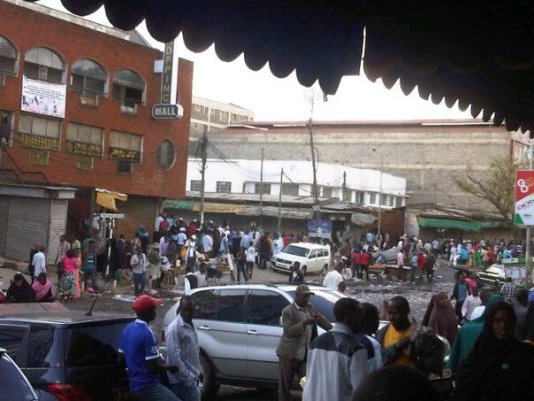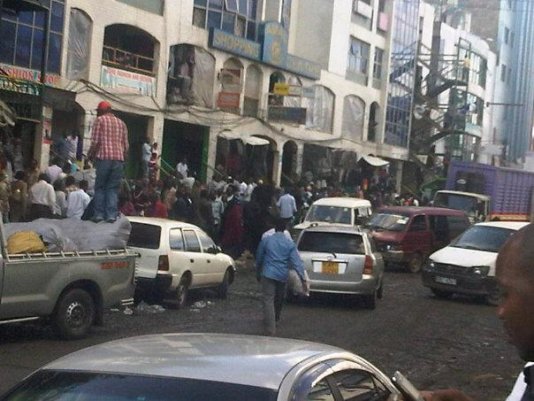- About
- Topics
- Picks
- Audio
- Story
- In-Depth
- Opinion
- News
- Donate
-
Signup for our newsletterOur Editors' Best Picks.Send
Read, Debate: Engage.
| November 25, 2012 | |
|---|---|
| tags: | #blast, #bus bombing, #business, #Eastleigh, #investment, #Kenya, #Little Mogadishu, #Mogadishu, #Nairobi, #piracy, #real estate, #Sara Jabril, #Somali Spring, #Somalia, #xenophobia |
| located: | Kenya, Somalia |
| by: | Sara Jabril |
The Somali Spring?
Recently, however, there has been reason for hope. For the first time since 1991, when dictator Said Barre’s rule came to a violent end, a new leader has been chosen within the country. Somalia’s 2012 presidential elections saw Hassan Sheikh Mohamoud elected as the new president. The good news doesn’t stop there. The government succeeded in chasing out the Islamist extremist al-Shabaab group out of Mogadishu, Somalia’s capital. As a result, Mogadishu has experienced a real housing boom that saw property prices rise for the first time in over 20 years. On top of this, pirate activity is said to have been continuously decreasing. The Economist recently quoted a report by the International Maritime Bureau (IMB), which stated that the number of attacks declined by nearly two thirds since 2011.
Eastleigh - Little Mogadishu
With all the negative press the East African country has received over the last two decades, a number of compelling developments have been simply overlooked. Just like there is a “Little Italy” in New York’s district of Manhattan, there is now a “Little Mogadishu” in one of the suburbs of Kenya’s capital. As Somalis have been escaping their home country due to the uncertainty of a future there, many have found a new home in Nairobi’s suburb Eastleigh, which is now almost entirely inhabited by Somali immigrants and a center for Somali business.
The development of Somali-owned businesses has been a true success story. When Somalia as a functioning state collapsed and the economy broke down in the early 90s, a big fraction of economic activity has simply been relocated - or exported - to Kenya. A paper published by the think tank Chatham House, describes some of the effects of these developments:
“The economic transformation of Eastleigh has brought a new level of competition to Nairobi, substantially reducing the cost of goods and services. Growing Somali investment in Nairobi has also attracted banks and other service-providers, demonstrating that urban refugees are not necessarily a burden on the state and can be an economic asset.”
It is true that immigrants usually contribute a fair share towards the economic prosperity of their country of origin, thereby functioning as an economic asset; one might take Mexican immigrants in the United States as one example. Rather unfortunately, and despite this fact, however, xenophobia is still a common phenomenon.
Growing xenophobia against Somalis
This is precisely what can be witnessed in Kenya. For a long time, there had been rising frustration among Kenyans, who saw an increase in housing prices due to the increased and successful Somali business activity. Additionally, there are concerns in relation to funds and starting capital for the vast number of Somali businesses. Many people believe that a large portion of the money, which flows into Somali business investments in Kenya, such as real estate, is in fact money that stems from piracy. As the Financial Times wrote this weekend:
“Laden with sacks of cash, these rogue investors were said to be converting illegally-acquired ransom bounty into commercial and residential real estate in Nairobi’s bustling Eastleigh district.” (FT Weekend, 17/18 November 2012)
After a bus bombing in Eastleigh this month, which left many injured and at least 8 people dead, a mob of Kenyans attacked Somalis and their shops - blaming them for the deadly blast. The situation remains tense, and another outbreak of ethnic clashes is not implausible, even though a divide along ethnic lines is not as simple as it would seem. Nairobi and its districts are quite diverse, being home to Kenyans, ethnic Somalis and Kenyan Somalis alike.
One could say that the militant al-Shabaab group is the root of the problem. Since the Kenyan army’s involvement in the fight against al-Shabaab in Somalia, there have been several attacks on Kenyan soil. For many people the equation is simple; a war on al-Shabaab equals a war on Somalis. Even though the attacks hurt both Kenyans and Somalis - and so do the resulting tensions and clashes.
Images: © Private


By copying the embed code below, you agree to adhere to our republishing guidelines.
